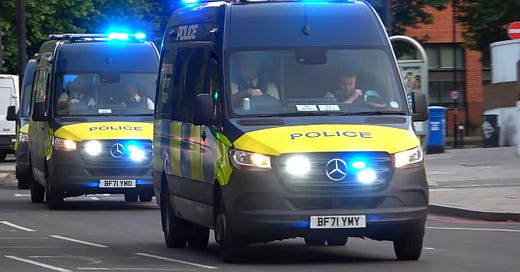The Thin Blue Line Cracks: Is It Time for a Police Union Shake-Up?
A new report exposes deep flaws in the Police Federation and calls for reforms that could reshape police representation.
The right to choose who represents you in negotiations over your pay, pensions, and working conditions should be a fundamental principle in any democratic society. Yet, for police officers in England and Wales, that choice does not exist. Under the Police Act 1996, officers are required to be represented solely by the Police Federation of England and Wales (PFEW), an organisation that has been repeatedly criticised for its failures in governance, accountability, and advocacy.
A recently published argument titled Breaking the Monopoly makes a compelling case for why this needs to change. It highlights the perceived failures of the PFEW and presents a clear, logical solution: amend Sections 59 and 64 of the Police Act 1996 to allow officers to form and join alternative representative bodies with equal negotiating rights.
A History of Alleged Failure
The Police Federation was established to act as the voice of rank-and-file officers, and in many cases, local Federation representatives do a fantastic job advocating for their colleagues. However, according to Breaking the Monopoly, the senior management of the PFEW has come under heavy criticism. The Normington Review (2014) and the Operation Sunrise Report (2023) both detailed significant governance failures within the organisation, demonstrating a lack of accountability and transparency at the top levels. These reports highlight a pattern of apparent mismanagement that has left officers feeling unheard and unsupported.
Surveys cited in Breaking the Monopoly [@CopsAgainst on X] suggest this discontent is widespread. A staggering 91% of officers believe the Federation must change, yet only 29% think it actually can. Trust in the organisation has eroded so significantly that many officers feel trapped in a system that does not serve their interests. Scandals such as Plebgate, the mishandling of pay disputes, and the botched police pension challenge have been pointed to as reinforcing this perception, damaging not just the Federation’s reputation but also public and political trust in the police service as a whole.
Most notably, a 2023 Employment Tribunal ruling found the PFEW guilty of discrimination and victimisation against its OWN members. This ruling has been presented as further evidence that the Federation is failing those it is meant to represent.
Got a story or video to share? Need to get something off your chest?
Our team of experienced former emergency services and armed forces personnel wants to hear from you! With 300,000 monthly views, your story could reach a wide audience. Email us at contact@emergency-services.news.
The Wider Impact on Policing and Public Trust
The consequences of ineffective representation extend beyond officers themselves. According to Breaking the Monopoly, when those on the frontline feel demoralised, poorly rewarded, and unsupported, it inevitably affects their performance and morale. Low morale leads to lower retention rates, making it harder to recruit and retain talented officers. A demoralised workforce is also more likely to experience burnout and mental health struggles, further impacting their ability to serve the public effectively.
Furthermore, the argument suggests that when poor practices and toxic workplace cultures go unchallenged, as noted in the Casey, Angiolini, and Macpherson reports, the entire profession suffers. Effective representation is not just about improving conditions for officers—it is about ensuring better policing. A stronger, more accountable representative body would be able to push for reforms that enhance the profession, benefiting both officers and the public alike.
The Solution: Giving Officers a Choice
The answer to this long-standing issue, as proposed in Breaking the Monopoly, is clear. Police officers must be granted the right to form and join alternative representative bodies with equal legal standing to the PFEW. By amending the Police Act 1996, the government can introduce competition into police representation, forcing organisations to truly advocate for their members or risk losing them to alternatives that will.
This reform is not radical—it is common sense. In nearly every other sector, workers have the freedom to choose their own representation. Why should police officers be denied this basic right? Providing choice would encourage greater accountability, better advocacy, and, ultimately, a stronger and more effective police force.
Time for Action
The monopoly held by the PFEW, according to Breaking the Monopoly, has failed police officers for too long. If the government is serious about improving policing, boosting morale, and restoring public trust, it must act. Amending the Police Act 1996 is not just about fairness—it is about the future of policing itself.
The authors of Breaking the Monopoly have called on MPs, policymakers, and police officers to support this necessary change. Without action, the authors of Breaking the Monopoly claim that the status quo will persist, and the very people tasked with protecting the public will remain unheard, unsupported, and unprotected.
OPINION: Time to Break the Monopoly? - Why Police Officers Deserve the Right to Choose Their Representation
In a democratic society, the right to choose should extend to every professional's representation. Yet, police officers in England and Wales are bound by an archaic law that denies them this basic right. The Police Federation of England and Wales (PFEW) holds a monopoly on representing police officers, a situation that has led to systemic failures and deep dissatisfaction among those on the front lines. It's high time this monopoly was reconsidered [The rest of this article is for premium subscribers]
Keep reading with a 7-day free trial
Subscribe to ESN Report to keep reading this post and get 7 days of free access to the full post archives.



